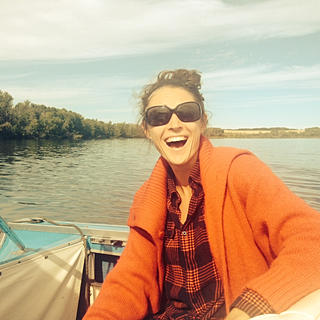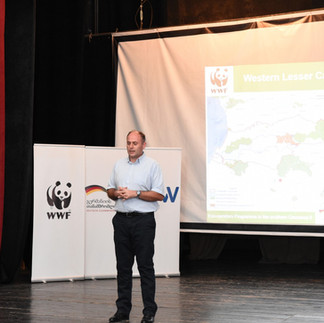Faces of the ECF | Irakli Gogoladze
- Carmen Kuntz
- Sep 30, 2023
- 5 min read
Updated: Jan 15, 2024
Irakli Gogoladze ECF National Coordinator Georgia

Faces of the Eco-Corridors Fund is a series of stories that provides insight into the people behind the programme. It gives a face to the work ECF is doing in the Caucasus - from office buildings to remote villages and everywhere in between. These are the stories of the people who are implementing the ECF’s unique approach to nature conservation, where local land-use and traditional practices overlap with connecting protected areas and enhancing ecological sustainability. A partnership for living landscapes.
Education:
I studied at the Georgian Technical University in Tbilisi and obtained B.Sc. (2002), M.Sc. (2005) and Ph.D (2019) degrees in Engineering and Economics, as well as B.Sc. in Law (2008). Additionally, I studied at the Royal Institute of Technology in Stockholm from 2004-2005 and obtained a M.Sc. degree in Land Management.
Hometown: I was born in the oldest and biggest city of west Georgia, Kutaisi, but since my childhood I have lived in the capital, Tbilisi.
Professional Experience: From 2003-2005 I worked in the Energy Efficiency and Cleaner Production Centre of Georgia and covered issues such as cleaner production and energy efficiency in industry and environmental & quality management systems and standards. For 12 years (2006-2017), I worked in various positions for the National Agency of Public Registry in Georgia, including working as a state registrar and head of the information and archive department. And from 2018 to 2020 I served as a consultant for the first phase of the ECF programme, providing support and consultancy in: the establishment of community-based legal entities; legal management of lands by local communities; and planning, management and development of selected rural areas.
About Armen:
I live in a multigenerational family together with my parents, wife and four children. I love spending time with my friends, especially during outdoor events. I am fond of travelling, playing and watching football, chess, and other intellectual games.
In your eyes, what does the landscape in Georgia look like?
Georgia is known for its nature - for its stunning mountain ranges that are snow-capped in the winter. And the fertile valleys with lush vegetation found between the mountain ranges , home to many of Georgia's cities and towns and are where most of the country's agricultural activities take place. Georgia has several plateaus, including the Iori and the Samtskhe-Javakheti Plateaus, that have rolling hills and are used for farming and pastureland. Numerous rivers flow through Georgia, including the Mtkvari and the Rioni, and there are several beautiful lakes - with Lake Paravani being the largest. To the west, Georgia has a nice coastline along the Black Sea that features a mix of sandy and rocky beaches and in the east Georgia has extensive forests, home to a wide variety of flora and fauna. I might be biased, as I am Georgian, but the landscapes of my country are incredibly diverse with overwhelming natural beauty.
What does nature in Georgia mean to you? In the Georgian language the word for “nature” is buneba, which also means, "character" or "mood". Definitely, the nature in my country has shaped the corresponding character of its inhabitants. On the other hand, when Georgians speak of nature, we always use the collocation deda buneba, meaning, "mother nature” emphasizing that nature – like a mother - is a source of life, food, care and support.
“When Georgians speak of nature, we always use the collocation deda buneba, meaning, "mother nature” emphasizing that nature – like a mother - is a source of life, food, care and support.” - Irakli Gogoladze
As an ECF National Coordinator, what are some of your duties and responsibilities? As a national coordinator I am responsible for the overall coordination of all the processes, nature conservation measures and activities of the project in Georgia. The core principle I try to pursue lies in transparent and timely communication with all relevant stakeholders such as community members, facilitators, regional working groups and municipalities. We try to build close human relationships with the locals, as mutual trust helps us to comprehend their challenges and needs. Considering and respecting the suggestions and wishes of locals is key to my work, and I always strive to contribute specific solutions that are adequate and suitable to the local context.

What is the current status of the ECF Project in Georgia?
When it comes to the second phase of the ECF, we plan to spread further the eco-corridor area and interlink protected areas of Borjomi-Kharagauli and Kintrishi. With the active support of our local facilitators, we have already identified the potential communities, established regional working groups in Khulo, Shuakhevi and Adigeni Municipalities and even held several competitions through the ECF’s Financial Participatory Approach. We plan to hold more competitions. The results, together with information on land use rights will help us determine the suitable areas and groups of active locals and communities to work with on Conservation Agreements in the future.
How many Conservation Agreements have been signed in Georgia?
There are 9 signed and active Conservation Agreements in Georgia, all in the Adigeni Region.
What are some of the upcoming ECF Georgia events?
We plan to hold a number of FPA competitions in Khulo, Khevasheni and Adigeni Municipalities during the winter. In the new year we plan to elaborate on detailed land-use plans for the certain communities and clarify land-use rights. We also plan to elaborate a menu of conservation measures that should constitute an integral part of future Conservation Agreements. And we hope to hold the Regional Conference of ECF Caretakers from Armenia, Azerbaijan and Georgia in the spring, where a Caretakers Code of Conduct for all the caretakers of South Caucasus will be adopted.
What does ECF look like on the ground in Georgia - are there any exciting developments or new accomplishments? The unique measure – adopted so far solely in Georgia – is the ECF community-managed livestock solidarity scheme. The idea behind this scheme is to reduce the economic damage to farmers caused by attacks of wild animals on domestic animals. The long-term objective is that the proper implementation of this scheme shall gradually soften the attitude of locals towards carnivores and will reduce the practice of killing them. And to incorporate these schemes into all ECF Conservation Agreements moving forward.
As a result of the ECF, and as a response to these new solidarity schemes, some locals, (who used to live abroad in order to sustain family members and elderly parents), stated they returned to villages. They expressed gratitude to the ECF for creating such a unique opportunity for these remote areas. Representatives of local municipalities also voiced thanks, as small projects that would otherwise be financed by their sparse budget, have been implemented through the ECF.
In your opinion, why is ECF effective? How does it work towards the conservation of nature and also economic improvements?
I think that it is the close and trustful relations firmly established between the project team and community members that make the ECF effective. Locals have stated that the implementation of the measures have strengthened relations not only between the villagers of each village, but served as a robust "team-building" tool in municipalities as well. The success of the ECF programme is manly built upon the shoulders of the locals who – notwithstanding severe natural, climatic or socio-economic circumstances – are both brave and resilient to not abandon the areas but to stay strong on the ground, retain traditions, raise future generations and, simultaneously protect their unique environment and biodiversity.
Irakli has been involved with the ECF since its start in the form of a land tenure expert. The ECF Team is happy to have him on board now as a National Coordinator, as he brings his experience and existing relationships to the project, along with positive energy and Georgian generosity.


















































